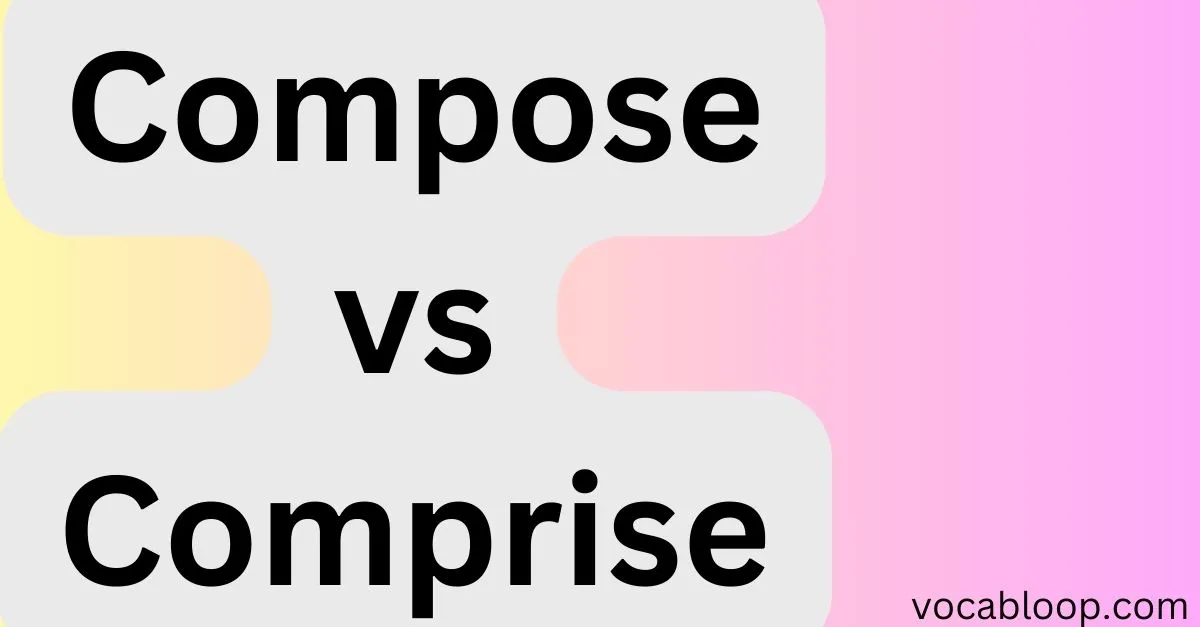The English language is full of terms that confuse even seasoned writers, and the debate between compose vs comprise is a classic example. While these words are often used interchangeably, their meanings and applications differ significantly. Misusing them can lead to common usage errors, undermining your message’s clarity.
Compose refers to creating or assembling parts into a whole, while comprise means including or encompassing those parts. Understanding this distinction is crucial for achieving grammatical precision and avoiding language mistakes. This guide unpacks their definitions, origins, and proper usage, offering writing tips to ensure you use each word correctly, enhancing both your communication skills and confidence.
What Is There Confusion Compose vs Comprise?

The confusion stems from their overlapping contexts. Both words deal with parts and holes, but they do so differently. People often use them interchangeably, leading to common usage errors. For instance, saying “The bouquet is comprised of roses” is incorrect but frequently heard.
The real issue lies in understanding their language rules and nuances. Compose focuses on the act of creating or assembling, while comprise emphasizes inclusion. By knowing this usage distinction, you can avoid grammatical errors and ensure proper expression in both formal and informal settings.
What Is Compose?

Is the Compose Word Correct?
Yes, “compose” is a correct and widely used term. Its usage aligns with the act of putting things together. It’s a fundamental word for creating and building, often appearing in music, writing, and design contexts.
Definition:
To “compose” means to create or form by combining parts or elements. For example, “She composed a beautiful melody.”
Meaning:
The word emphasizes construction or assembly. It implies bringing individual components together to create a complete entity. For instance, “The meal is composed of fresh ingredients” describes the assembly of parts into a whole.
Usage:
“Compose” appears frequently in discussions about structure or organization. It works well in sentences where the focus is on how something is made up of its parts. Examples include, “The committee is composed of five experts.” It’s perfect for grammatical precision and creating vivid descriptions.
What Is Comprise?

Is the Word Comprise Correct?
Yes, “comprise” is correct, though it’s prone to misuse. A common error is adding “of” after it, such as in “comprises of,” which is grammatically incorrect.
Definition:
“Comprise” means to include or contain. It refers to a whole that consists of specific parts, as in, “The team comprises players, coaches, and assistants.”
Meaning:
Unlike “compose,” “comprise” stresses inclusion and completeness. It describes the whole as embracing all its parts. For instance, “The class comprises students from diverse backgrounds” indicates the parts that make up the whole.
Usage:
To use “comprise” correctly, avoid saying “comprise of.” Instead, state the components directly. For example, “The collection comprises rare artifacts.” This usage guide ensures writing correctness and clarity.
Quick Summary
| Feature | Compose | Comprise |
| Definition | To create or assemble | To include or contain |
| Focus | Assembly | Inclusion |
| Example | “The song is composed of…” | “The team comprises…” |
Compose vs Comprise as Parts of Speech
Both words act as verbs but differ in function. “Compose” refers to an action, such as putting pieces together, while “comprise” describes a state of inclusion. This distinction highlights their unique parts of speech and ensures accurate language in writing.
For example:
- “The orchestra is composed of talented musicians.” (Assembly)
- “The orchestra comprises strings, brass, and percussion.” (Inclusion)
By understanding these roles, you can navigate their word contrast confidently.
Pronunciation of Compose vs Comprise

Pronunciation plays a crucial role in distinguishing between “compose” and “comprise” during verbal communication. While their meanings differ, clear pronunciation ensures your listener understands the intended context.The word “compose” is pronounced as /kəmˈpoʊz/, with emphasis on the second syllable. The “s” sound at the end is soft, blending smoothly with the rest of the word.
For example, in the phrase “The orchestra will compose a new symphony,” the soft “s” gives it a fluid and harmonious sound, aligning with its meaning of creation or assembly.On the other hand, “comprise” is pronounced as /kəmˈpraɪz/. Here, the emphasis also falls on the second syllable, but the ending features a sharper “z” sound. This crisp ending reflects the word’s role in denoting inclusion or containment. For instance, in the sentence “The library comprises rare books,” the sharp “z” underscores the act of encompassing parts within a whole.
Which One Is More Acceptable: Compose vs Comprise?
Both words are acceptable in formal English, but their correct usage depends on context. “Compose” is easier for most people due to its straightforward meaning, while “comprise” often faces common mistakes like “comprise of.”
Understanding their language differences avoids confusion. Writers seeking accurate communication should always double-check usage with a writing assistant or grammar guide.
Compose in British English and American English
The term “compose” holds the same core meaning in both British and American English. It signifies the act of creating, assembling, or organizing various elements into a whole. However, its usage varies slightly. In American English, writers and speakers often favor simpler alternatives like “made up of,” especially in casual contexts. This preference aligns with the American tendency toward straightforward language.
Conversely, British English tends to favor “composed of” in both formal and informal settings, reflecting a more traditional adherence to its grammatical roots. These subtle differences highlight the evolution of the English language across regions, emphasizing clarity and linguistic flexibility.
Comprise in British English and American English
“Comprise” is equally correct in both British and American English, but its prevalence varies. In American English, the word is less commonly used, with alternatives such as “includes” or “consists of” frequently taking its place. This shift reflects an effort to simplify language for broader accessibility.
British English, however, retains a stronger preference for “comprise” in formal writing and speech, maintaining its traditional use. These variations reveal a linguistic trend where British English favors preserving older forms, while American English leans toward modernization and practicality in communication.
Common Mistakes: How to Avoid Them
Misusing “compose” and “comprise” is a frequent error in English writing. A common mistake is saying “comprise of,” which is grammatically incorrect. For example, “The team is comprised of five players” should instead be “The team comprises five players.” Another frequent issue is using the two terms interchangeably. Remember, “comprise” means the whole includes the parts, while “compose” means the parts make up the whole.
For instance, “The puzzle comprises 100 pieces” is correct, while “The puzzle is composed of 100 pieces” is also correct but serves a different structural purpose. Utilizing grammar tools or editing software can help catch these language mistakes and ensure accurate communication.
Trick to Remember the Difference: Compose vs Comprise
A helpful mnemonic for distinguishing these terms is: “The whole comprises the parts, and the parts compose the whole.” This simple phrase encapsulates their grammatical relationship, making it easy to choose the correct term.
Think of “comprise” as an umbrella term, representing inclusion or containment, and “compose” as an action word, denoting construction or assembly. This trick ensures proper usage and avoids confusion, reinforcing linguistic precision and accurate communication in writing and speech.
Origins of Compose vs Comprise

The word “compose” originates from the Latin term componere, which means “to put together” or “to arrange.” It combines the prefix com- (together) with ponere (to place). This etymology reflects its meaning of assembling or creating something by combining parts. Over time, “compose” evolved into a versatile term used in music, art, writing, and general contexts to signify creation or construction.
“Comprise” stems from the Latin word comprehendere, which translates to “to grasp” or “to include.” It merges com- (together) with prehendere (to seize or take). Initially referring to encompassing or embracing, the word shifted in modern English to mean “to include” or “contain.” Its roots highlight its role in describing the relationship between a whole and its constituent parts.
Synonyms of Compose vs Comprise
Compose
- Create
- Construct
- Organize
- Build
- Form
- Arrange
- Assemble
- Produce
- Combine
- Make
Comprise
- Include
- Contain
- Consist of
- Incorporate
- Encompass
- Hold
- Embrace
- Involve
- Constitute
- Aggregate
Sentences in Daily Usage of Compose vs Comprise
Compose:
- The artist composed a beautiful melody.
- Our team is composed of experts in various fields.
- She loves to compose poetry.
- The menu is composed of diverse cuisines.
- They composed the report overnight.
- His speech was well-composed.
- The committee is composed of five members.
- He composes music in his free time.
- The picture was perfectly composed.
- The novel is composed of multiple themes.
Comprise:
- The bouquet comprises several types of flowers.
- The course comprises five main modules.
- Her wardrobe comprises elegant dresses.
- The fleet comprises ten ships.
- The team comprises skilled players.
- The recipe comprises fresh ingredients.
- The forest comprises diverse wildlife.
- The library comprises thousands of books.
- His collection comprises rare coins.
FAQs
What is the main difference between compose and comprise?
“Compose” refers to creating something, while “comprise” means including parts.
Can they be used interchangeably?
No, their meanings differ significantly.
Why is “comprise of” incorrect?
“Comprise” inherently means inclusion, so “of” is redundant.
How do Americans prefer to use these words?
Americans often favor “made up of” or “consists of” over “comprise.”
Are there regional differences in usage?
Yes, British English uses “comprise” more frequently than American English.
Conclusion
Comprise vs Compose is key to achieving precision in your writing. By understanding their unique meanings and avoiding common mistakes, you can ensure proper grammar and punctuation. Comprise refers to the whole including its parts, while compose refers to the act of putting parts together to create something.
Keeping these distinctions in mind will improve your language accuracy and confidence. With practice, your writing will reflect a higher level of linguistic precision, making your communication clearer and more effective.

Alex Hormozi is a seasoned blogger at Vocab Loop, known for his deep insights into language, vocabulary, and grammar. With years of experience in writing, Alex shares practical tips and effective strategies to help readers improve their linguistic skills and enhance their writing abilities.

